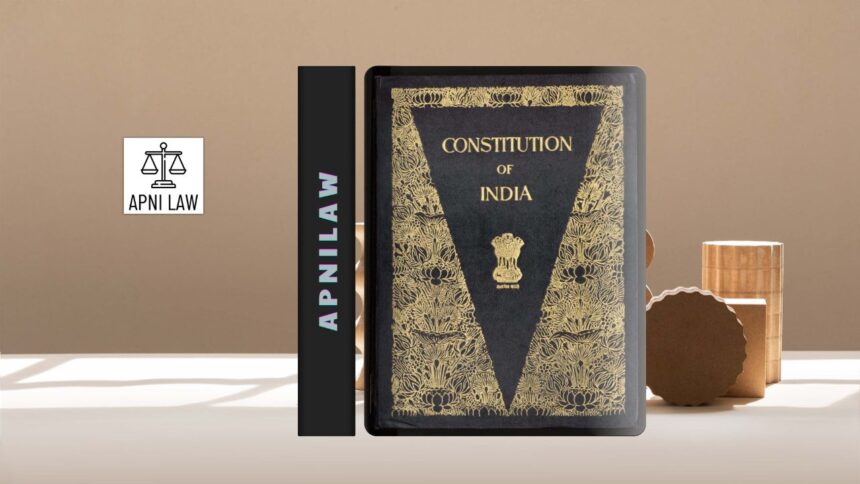The National Commission to Review the Working of the Constitution (NCRWC) proposed major reforms to ensure free, fair, and transparent elections in India. The Commission aimed to strengthen democratic processes by addressing issues like criminalization of politics, corruption, caste-based campaigning, and lack of transparency in political funding. These recommendations continue to influence debates on electoral reforms in India.
Disqualification Of Candidates With Criminal Background
The NCRWC emphasized the urgent need to decriminalize Indian politics. It recommended amending the Representation of the People Act to disqualify individuals charged with serious offenses punishable by imprisonment of five years or more. According to the proposal, once charges are framed and not cleared within one year, such individuals should be barred from contesting elections until the trial concludes.
The Commission further suggested that anyone convicted of heinous crimes such as murder, rape, smuggling, or dacoity should face a permanent disqualification from contesting elections. This recommendation aimed to ensure that only individuals with clean records could represent the people.
It also proposed strict penalties for political parties that knowingly nominate such candidates. Parties promoting criminal elements should be deregistered and derecognized, reinforcing accountability within the political system.
Curbing Caste And Communal Politics
The NCRWC viewed caste-based and communal campaigning as a major threat to national unity and democratic integrity. It recommended that any candidate or political party using caste or religion to influence voters should face mandatory imprisonment and immediate disqualification.
The Commission urged for zero tolerance toward attempts to promote communal hatred or polarization during elections. It stressed that elections should be fought on issues of governance, development, and policy — not on identity-based divisions.
Strengthening The Role And Powers Of The Election Commission
To ensure fair elections, the NCRWC recommended giving the Election Commission of India (ECI) greater powers and autonomy. The Commission proposed empowering the ECI to countermand elections and order fresh polling in cases of violence, bribery, or large-scale malpractice.
It also supported the use of electronic surveillance and tamper-proof technologies at sensitive polling stations to maintain transparency. The ECI should have the authority to enforce disciplinary actions against candidates or parties violating election laws.
The NCRWC believed that an independent and empowered Election Commission is essential for protecting the integrity of India’s democratic process.
Promoting Political Party Reforms
One of the key recommendations of the NCRWC was to promote transparency and internal democracy within political parties. The Commission proposed mandatory disclosure of party finances, including the sources of political funding and expenditure details.
It emphasized that political parties should regularly hold internal elections for leadership positions and candidate selections. This would prevent excessive concentration of power in a few individuals or dynasties.
The NCRWC also suggested that political parties should be treated as public institutions, accountable to the people under the law. Transparent functioning would help rebuild citizens’ trust in the political system.
Regulating Election Expenditure
The Commission identified money power as a key factor undermining the fairness of Indian elections. It recommended stricter monitoring and limits on election expenditure by candidates and parties.
All parties and candidates should be required to declare their election spending publicly, ensuring that funds are used only for legitimate campaign activities. The NCRWC encouraged the establishment of independent auditing mechanisms to track political donations and spending patterns.
By controlling the influence of wealth in politics, the Commission sought to create a level playing field for all candidates, especially those from modest backgrounds.
Promoting Clean And Transparent Elections
The NCRWC’s overall vision for electoral reform centered on ensuring clean, transparent, and issue-based elections. It wanted to remove criminal influence, reduce the role of money, and ensure that voters make informed choices.
The Commission also stressed voter awareness programs to educate citizens about their rights and the value of ethical voting. It encouraged the Election Commission to collaborate with civil society organizations to promote responsible electoral behavior.
Purpose And Significance Of The Recommendations
The NCRWC’s recommendations addressed deep-rooted problems that weaken India’s democracy. By focusing on criminalization, corruption, and communalism, it aimed to restore the credibility of the electoral system.
The proposed reforms reflected the Commission’s belief that democracy can thrive only when elections are free from fear, money power, and social divisions. It envisioned an India where elections reflect the people’s genuine will, not the influence of wealth or violence.
Long-Term Impact On Indian Democracy
Although the NCRWC’s recommendations were advisory, they have influenced ongoing discussions on electoral reforms. Several later committees and reform movements, such as those by the Election Commission of India, Law Commission, and Association for Democratic Reforms (ADR), have echoed similar ideas.
The Supreme Court has also adopted certain principles aligned with NCRWC recommendations — for instance, mandatory disclosure of criminal records and assets by candidates. The movement toward clean politics owes much to the Commission’s early insights and foresight.
Many current proposals for political funding transparency, electoral bond reforms, and decriminalization of politics trace their roots to the NCRWC’s 2002 report.
For any specific query call at +91 – 8569843472
Conclusion
The NCRWC’s electoral reform recommendations laid a strong foundation for transforming India’s electoral democracy. By addressing corruption, criminalization, and lack of transparency, the Commission envisioned a system that truly reflects the will of the people.
Its proposals emphasized the values of fairness, accountability, and inclusiveness, making elections not just a procedural formality but a reflection of democratic integrity.
Even decades later, the NCRWC’s vision for clean and transparent elections continues to guide policymakers, reform advocates, and citizens committed to building a stronger democracy.








